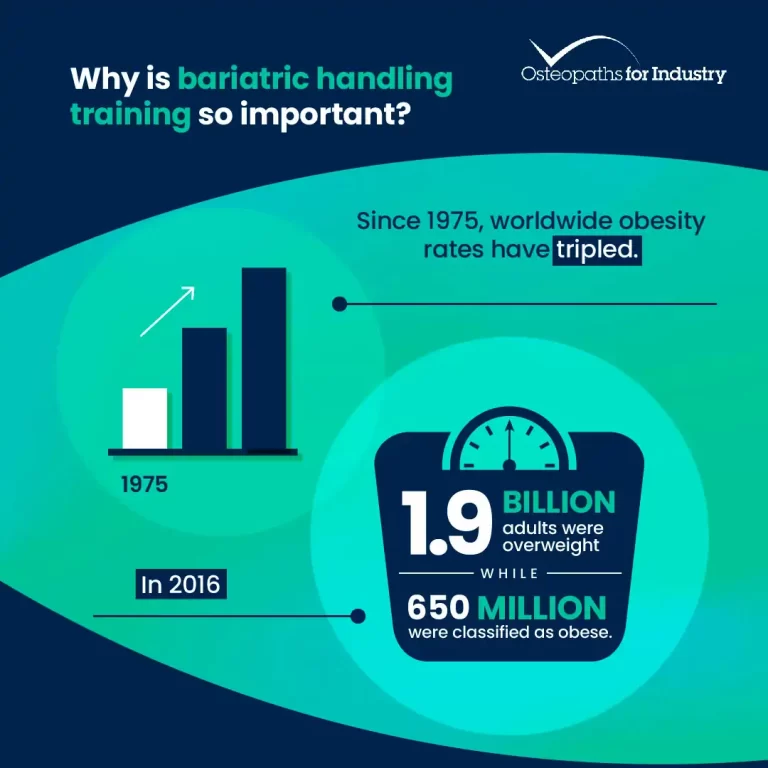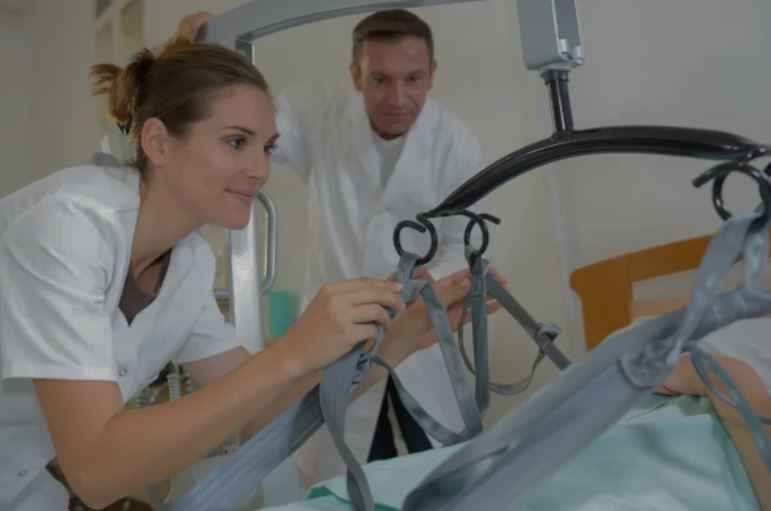Why is Bariatric Handling Training Becoming More Important?
At OFI, we’re excited to be expanding our portfolio of training services with the launch of our bariatric patient moving and handling training solutions¹. Brought to you by bariatric patient moving and handling specialists, we’re passionate about equipping you and your team with the skills and knowledge you need to provide the best care possible for larger patients.
Bariatric patient handling training has become increasingly important in healthcare due to the rising prevalence of obesity worldwide². This specialised training equips healthcare professionals with the knowledge and skills needed to safely and effectively care for bariatric patients – individuals with a body mass index (BMI) of 30 or higher³.
In this blog post, we’re delving into the reasons behind the increasing importance of bariatric handling training, exploring key statistics, safety concerns, and the positive impact effective practical training can have on both patients and healthcare providers.

Rising Obesity Rates: A Global Concern
The World Health Organization (WHO) reports a staggering tripling of worldwide obesity rates since 1975, with over 1.9 billion adults being overweight and 650 million classified as obese in 2016⁴. This surge in obesity has led to a higher volume of bariatric patients seeking care, placing a considerable burden on healthcare facilities, including hospitals, nursing homes, and other care settings.
Legal and Ethical Considerations:
Failing to provide appropriate care for bariatric patients can have legal and ethical implications. Therefore, it’s crucial for healthcare professionals to ensure they are delivering the highest standard of care for plus-sized individuals.
Safety Concerns in Bariatric Patient Handling:
Handling bariatric patients presents a range of unique safety concerns for healthcare providers around mobility, positioning, and transferring. These concerns stem from the handling challenges associated with the size and weight of these individuals, as well as potential complications related to their health conditions.
What Are Some Safety Concerns We Should Look Out For⁵?
Risk of Falls and Mobility Issues:
Bariatric patients often face mobility limitations due to their weight and associated health conditions. These patients may struggle with walking, balancing, or performing routine tasks, increasing the risk of falls and related injuries.
Risk of Musculoskeletal Injury for Healthcare Providers:
Providing care to bariatric patients can place immense physical strain on healthcare providers. This risk is primarily due to the increased weight and size of these patients, which can put excessive strain on the musculoskeletal system of the healthcare worker. Lifting or transferring these patients without proper techniques and equipment can lead to musculoskeletal injuries, particularly in the back, shoulders, and wrists.
Patient Positioning and Transfers:
Positioning bariatric patients for procedures, examinations, or basic care tasks requires specialised knowledge. Improper positioning can result in skin tears, pressure ulcers, or discomfort for the patient.
Equipment Limitations and Hazards:
Traditional medical equipment isn’t designed to adequately support the weight of bariatric patients. Using standard beds, wheelchairs, or commodes for bariatric individuals can lead to equipment failure, posing serious safety risks.
Specialised Equipment and Resources:
Caring for bariatric patients requires specialised equipment like heavy-duty beds, wheelchairs, and lift systems. Healthcare providers need training to operate this equipment safely.
Potential for Skin Integrity Issues:
Bariatric patients are at a higher risk of experiencing skin-related complications, including pressure ulcers. Moving or handling these patients improperly can exacerbate existing skin issues or create new ones.
Respiratory Complications:
Obesity can lead to respiratory challenges, such as obstructive sleep apnoea or reduced lung function. Improper handling can exacerbate these issues, potentially leading to respiratory distress.
Cardiovascular Strain:
The heart has to work harder to circulate blood in individuals with obesity. Strenuous movement or positioning changes without adequate support can increase cardiovascular stress.
Emotional Distress, Dignity, and Respect:
Bariatric patients may experience anxiety, embarrassment, or discomfort related to their size. Improper handling or insensitive care practices can lead to feelings of humiliation or degradation, impacting the patient’s mental wellbeing.
Risk of Emergencies:
Responding to emergencies with bariatric patients requires specialised training. Evacuating a bariatric patient from a building, for example, can be complex and dangerous without the proper knowledge and equipment.
Increased Risk of Comorbidities:
Obesity is associated with a higher risk of comorbid conditions, such as diabetes, heart disease, and sleep apnoea. These conditions may necessitate more frequent and complex healthcare interventions.
Comprehensive Training: Addressing Safety Concerns
Bariatric handling doesn’t only present a risk for the patient. Those providing the care can be put at risk of injury, especially if the correct training isn’t received.
Bariatric Handling: 7 Key Risks for the Handler⁶
- Excessive Physical Strain: Lifting, transferring, and repositioning bariatric patients can require significant physical effort, especially when proper equipment is not available or used correctly.
- Awkward Body Positions: Manoeuvring a bariatric patient may require healthcare providers to adopt awkward or unnatural body positions, increasing the risk of strain and injury.
- Repetitive Movements⁷: In the care of bariatric patients, healthcare providers may need to perform these tasks repeatedly, increasing the cumulative stress on their musculoskeletal systems over time.
- Inadequate Training: Insufficient or improper training in bariatric patient handling techniques can lead to incorrect lifting and transferring methods, increasing the risk of injury.
- Lack of Proper Equipment: Without access to specialised equipment designed for bariatric patients, healthcare providers may attempt to manage tasks manually, exacerbating the risk of musculoskeletal injuries.
- Unexpected Patient Movements: Bariatric patients may have difficulty with stability or coordination, which can lead to sudden movements or shifts in weight, increasing the risk for healthcare providers.
- Chronic Health Conditions in Providers: Healthcare providers with pre-existing musculoskeletal issues or health conditions may be at higher risk of injury when handling bariatric patients.
Improved Patient Experience and Outcomes:
This underlines just how important it is to provide your staff with comprehensive, in-depth bariatric moving and handling training. Good quality bariatric practical skills training plays a crucial role in improving patient experience and outcomes by ensuring that patients are treated with dignity, respect, and without unnecessary discomfort or risk of injury8. Countless aspects of a patient’s care will be enhanced by carers putting into practice the training they’ve received. These benefits include:
- Improved Safety and Comfort: Proper training ensures that healthcare providers are adept at handling bariatric patients safely and with minimal discomfort. This reduces the risk of injuries or incidents during transfers or procedures, promoting a more secure and comfortable experience for the patient.
- Preservation of Dignity and Respect: Adequate training emphasises the importance of treating bariatric patients with dignity and respect. Healthcare providers who are well-trained in bariatric care are more likely to be sensitive to the unique needs and challenges that these patients face, fostering a more dignified and respectful care environment.
- Reduced Anxiety and Emotional Distress: Bariatric patients may experience anxiety or emotional distress related to their size or health condition. When healthcare providers demonstrate competence in bariatric care, it instils confidence and reassurance in patients, alleviating potential emotional burdens.
- Efficient and Effective Care Delivery: Well-trained healthcare providers are more efficient in performing tasks related to bariatric patient care, such as transfers, wound care, and diagnostic procedures. This leads to smoother, faster, and more effective care delivery, positively impacting patient outcomes.
- Prevention of Complications: Proper handling techniques can help prevent complications such as pressure ulcers, skin tears, and musculoskeletal injuries. By minimising these risks, bariatric practical skills training contributes to better overall patient health and wellbeing.
- Improved Communication and Trust: Effective communication is crucial in any patient-provider relationship. When healthcare providers are well-trained in bariatric care, they can explain procedures, answer questions, and address concerns more clearly, building trust and rapport with the patient.
- Patient Empowerment: Being able to safely and confidently care for bariatric patients empowers healthcare providers to involve patients in their own care. This includes discussing treatment options, setting realistic goals, and making informed decisions together, ultimately leading to better outcomes.
- Early Detection of Issues: Well-trained healthcare providers are more likely to notice early signs of complications or changes in a patient’s condition. This enables prompt intervention and treatment adjustments, potentially preventing more serious problems from developing.
- Compliance with Best Practices and Standards: Bariatric practical skills training ensures that healthcare providers are up to date with the latest best practices and quality standards for bariatric patient care. This compliance leads to better adherence to evidence-based guidelines, improving outcomes.
- Positive Impact on Healthcare Provider Wellbeing: Healthcare providers confident in their bariatric care skills are less likely to experience stress, anxiety, or burnout related to patient handling. This, in turn, leads to a more positive and focused care environment, benefiting both patients and providers.
- Cost Savings: Properly trained healthcare professionals are more efficient and effective in caring for bariatric patients. This can lead to cost savings by reducing the likelihood of injuries, rehospitalisations, and the need for additional resources.
In Summary
In summary, high-quality bariatric practical skills training directly contributes to a more positive patient experience and improved outcomes by ensuring safe, dignified, and effective care delivery. It enhances communication, trust, and empowerment while also reducing the risk of complications and optimising overall patient wellbeing. It’s something that should never be compromised.
References
· “Economic Impact of Overweight and Obesity to Surpass $4 trillion by 2035”, World Obesity – www.worldobesity.org/news/economic-impact-of-overweight-and-obesity-to-surpass-4-trillion-by-2035#:~:text=1%20in%204%20people%20(nearly,rapidly%20among%20children%20than%20adults. · Obesity, NHS – www.nhs.uk/conditions/obesity/ · Obesity and Overweight, World Health Organization – www.who.int/news-room/fact-sheets/detail/obesity-and-overweight
· “Top 7 Risks Associated with Moving and Handling Bariatric Patients in Hospital”, Felgains – www.felgains.com/blog/top-7-risks-associated-with-moving-and-handling-bariatric-patients-in-hospital/ · “Safe Moving and Handling of Bariatric Patients”, Vendlet – www.vendlet.com/knowledge-and-cases/safe-moving-and-handling-of-bariatric-patients
· “Manual Handling Risks Associated with the Transportation of Bariatric Patients in Australia”, Journal of Emergency Primary Health Care” – journals.sagepub.com/doi/pdf/10.33151/ajp.8.2.101
· “Risk to Healthcare Organizations and Staff Who Manage Obese (Bariatric) Patients and Use of Obesity Data to Mitigate Risks: A Literature Review”, Pub Med –pubmed.ncbi.nlm.nih.gov/33727820/
· “Bariatric Handling: A Case of Understanding”, Health Business – healthbusinessuk.net/features/bariatric-handling-case-understanding · Bariatric/Plus Size Moving and Handling (M&H), LGNBE – lgnbe.org.uk/resources/G15.pdf
· “Bariatric Patient Handling: Challenges and Practical Solutions in Healthcare”, Bariquins – medium.com/@bariquins/bariatric-patient-handling-challenges-and-practical-solutions-in-healthcare-33b18e96b9e5








